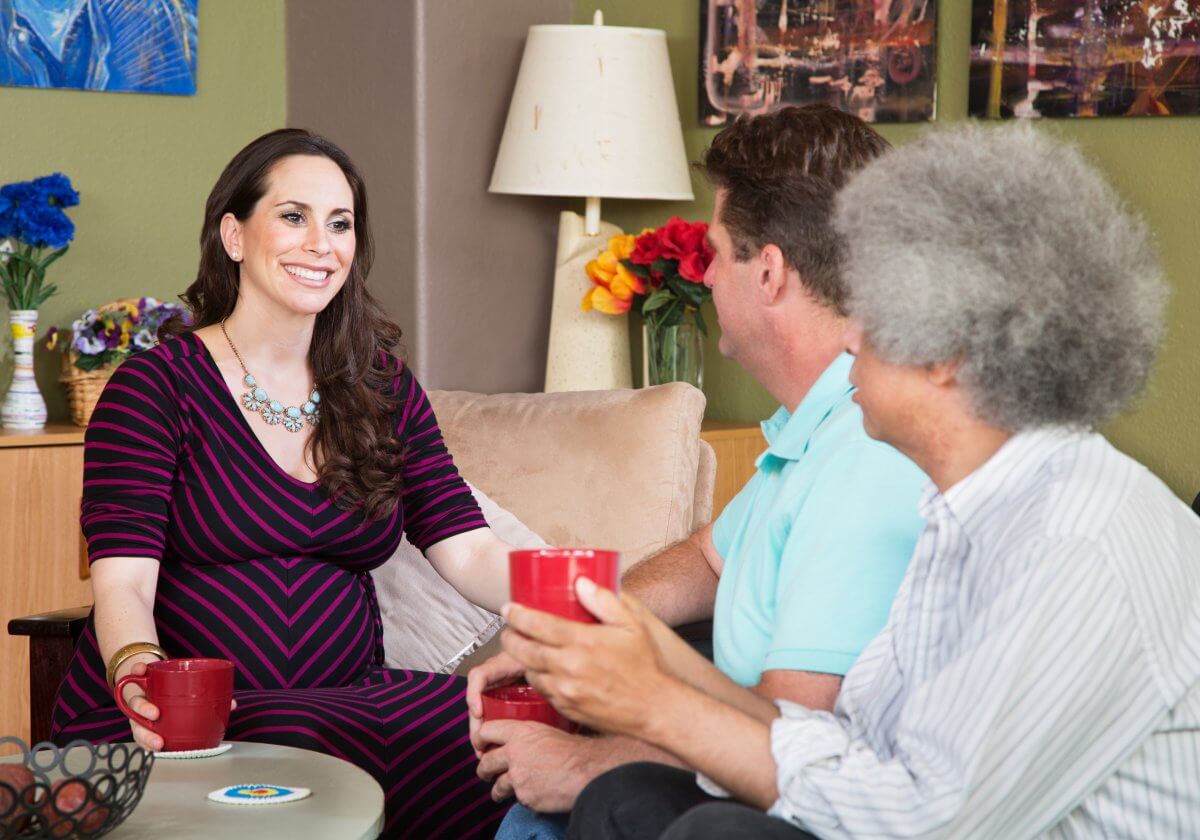Surrogacy is an act of generosity and compassion, often used to help couples fulfill their dreams of parenthood. In some cases, you might be thinking about becoming a surrogate for a friend.
While being a surrogate mother for a friend allows you to skip the matching process of, it’s crucial to recognize that being a surrogate for a friend comes with a unique set of complexities that require careful consideration and preparation.
As always we’re always here to help you navigate the complexities of being a surrogate for a friend and although you don’t have to worry about completing the matching process, we can still help you with other aspects of your surrogate journey.
Contact us today to begin the process of becoming a surrogate for a friend. Our specialists are ready to help you begin this life-changing journey.
How
Does Being a Surrogate for
a Friend Work?
If you’re asked to consider being
a surrogate for a friend, you might feel thrilled by the chance to
support them in such a meaningful way. Witnessing their struggle with
infertility, you understand their desire to become parents. Helping them on
their journey to parenthood can feel incredibly rewarding.
Yet, there are specific requirements you must meet in order to be a surrogate for a friend. Professionals who handle surrogacy have certain rules in place to safeguard the health of the surrogate and enhance the chances of success for the intended parents during the embryo transfer process. These guidelines aim to ensure a safe, successful surrogacy journey.
Below are some of the requirements on being a surrogate mother for a friend:
- Age, Health, and Lifestyle Criteria: Meeting age requirements (usually 21–38), maintaining a healthy BMI, abstaining from smoking or drug use and having a successful prior pregnancy are crucial.
- Financial Independence: Being self-sufficient and not reliant on state assistance.
- Mental Health: Not being on certain medications for an extended period and passing psychological evaluations.
To learn more about the requirements of being a surrogate for a friend, please feel free to reach out to our surrogate specialists or call us at 1-800-875-2229. Top of Form
How to Be a Surrogate for a Friend
Once you’ve confirmed that you meet the criteria of being a surrogate for a friend, your next question is, “How do I become a surrogate for my friend?”
If both you and your friend are fully committed to this surrogacy path, there are specific steps you’ll need to follow to kick start the surrogacy process:
Step 1: Find a Surrogacy Professional
When you want to start the process of being a surrogate for a friend, you’ll need to work with a team of surrogacy professionals. Working with a surrogacy agency like American Surrogacy can help you navigate becoming a surrogate for a friend with confidence.
We will help you coordinate with other surrogacy professionals, organize your screening and assessments and provide support and counseling whenever you need it. Even though you’re becoming a surrogate for a friend, it doesn’t mean that you have to do it on your own. Our specialists are ready to help you begin your surrogate journey.
Step 2: Complete Screenings and Assessments
Everyone involved in the surrogacy process must complete background, medical and mental health screenings before you can begin the process of being a surrogate for a friend. These assessments ensure that all parties are ready for the complexities of the surrogacy process.
By completing the surrogacy process ahead of time, you can reduce the likelihood of a surrogacy failing later down the line in case any unforeseen circumstances arise. Surrogacy professionals will not proceed with the medical process until all screenings have been completed even when you’re becoming a surrogate for a friend.
Step 3: Draft a Surrogacy Contract
Before officially beginning the process of being a surrogate for a friend, you’ll need to work with your surrogacy professional to create a surrogacy contract. The surrogacy contract outlines every step of your upcoming surrogacy journey and includes responsibilities, expectations and potential risks of the process.
Just because you’re being a surrogate for a friend doesn’t mean you can skip this step of the process. This document protects your rights and interests during your upcoming surrogate journey.
What to Consider Before Being a Surrogate for a Friend
Becoming a surrogate for a friend can bring many positives for both you and your friend. It skips the need for matching services and might be a more affordable choice, providing peace of mind for everyone involved in the surrogacy journey.
But, despite the benefits of being a surrogate for a friend, there are specific challenges to think about before beginning your journey:
Impact on Friendship
Being a surrogate for a friend can profoundly impact the dynamics of your friendship. It’s essential to navigate this path delicately, acknowledging that emotional and physical strains might come up during the process.
Addressing Underlying Issues
Uncovering and addressing any underlying issues within your friendship before becoming a surrogate for a friend is crucial. Open and honest communication about expectations, boundaries and potential scenarios that may arise can make the process go more smoothly.
Financial Disputes
Establishing financial arrangements upfront can help avoid a bigger problem in the future. Even though you’re being a surrogate for a friend, clarity regarding compensation for medical expenses, lost wages and additional costs is crucial to avoid conflicts later.
Emotional Challenges
Being a surrogate for a friend can be emotionally taxing. The journey involves detachment after the birth, potential emotional turmoil and navigating the expectations and responsibilities that come with carrying a child for someone close to you.
While the journey of being a surrogate for a friend may pose challenges, it can also strengthen the bond between friends, offering a unique and lasting connection from the experiences shared throughout the process.
If you’re considering being a friend for a surrogate and want to begin the process, reach out to us now to speak with a trusted surrogacy specialist.

![Being a Surrogate for a Family Member [What to Know]](https://www.americansurrogacy.com/blog/wp-content/uploads/2023/08/Surrogate-for-Family-Member-1200x800.jpg)


![Pursuing Surrogacy with Family and Friends [Things to Consider]](https://www.americansurrogacy.com/blog/wp-content/uploads/2022/07/pursing-surrogacy-with-friends-and-family-1200x800.jpg)




